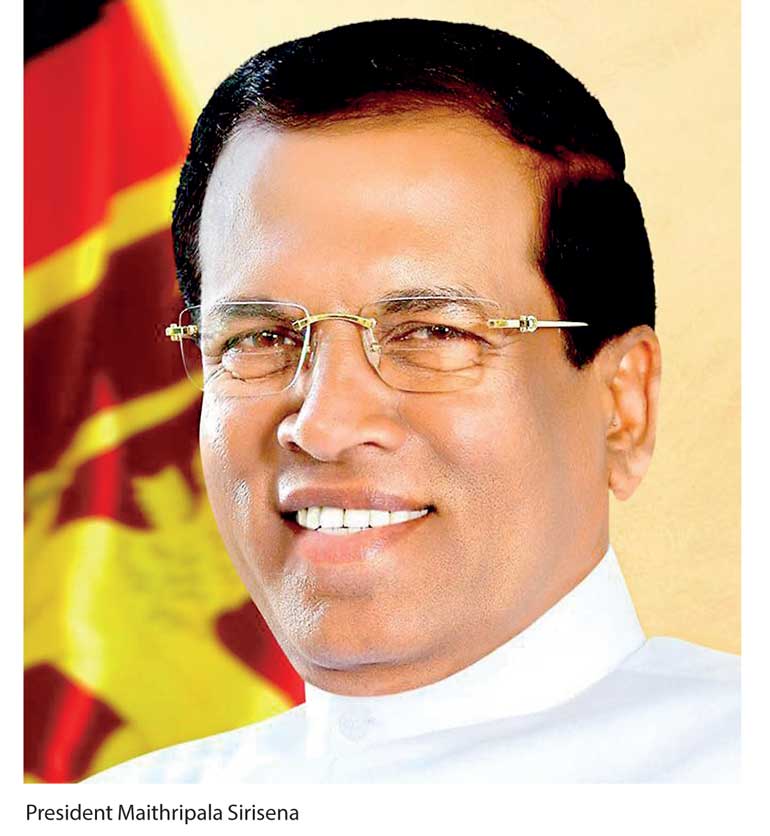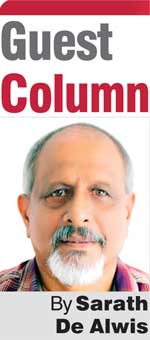Tuesday Feb 17, 2026
Tuesday Feb 17, 2026
Wednesday, 3 January 2018 00:00 - - {{hitsCtrl.values.hits}}


“Your beliefs become your thoughts, your thoughts become your words, your words become your actions, your actions become your habits, your habits become your values, your values become your destiny”
– Mahathma Gandhi
The opposite of a truthful statement is a false statement. In exceptional instances, the opposite of a profoundly truthful statement is another profoundly truthful statement.
President Sirisena’s recent statement that politics of this country is corrupt is a truthful statement. The opposite of that statement which is equally profound and truthful is that he is either incapable of doing anything about it or he will do nothing about it.
Minister S.B. Dissanayake was the pick of the President to address the candidates of the SLFP and the UPFA on contemporary political climate at the Sugathadasa Stadium. His homily on corruption was a masterpiece of distilled gimmickry and mediocre inanities. The other clean leader picked to administer the oath of ethical politics to candidates contesting local government elections was Minister Susil Premajayanth.
Indeed, they are master manifestations of our mechanics of governance. They epitomise the rewards of our political discourse. Wealth without work. Pleasure without conscience. Knowledge without character. Commerce without morality.
The President has the report of the Bond Commission. We are yet to be told what he proposes to do with it. If President Sirisena takes good governance, accountability and transparency beyond their slogan value in his now routine sermonising, he should release it to the press and the public.
In Athenian democracy all citizens were participants in the democratic process. Slaves and serfs were spectators. In modern democracy, universal citizenship has made us slaves to the process. Now we are anxious spectators awaiting to know about sovereign bonds and Ranil’s sovereign right to pick the governor of the Central Bank.
We will learn of the contents of the Bond Commission when our Good Governance President decides to share its findings with ‘we the people’. Till then we must wait.
Just now, President Sirisena has more important matters in his mind. To remain credible in 2018, he must make a decent performance in the Local Government elections in February.
He must beat the ‘Pohottu Platoon’ to become the undisputed leader of the SLFP. Till he does that convincingly, his flock will remain fickle pilgrims at his shrine and pragmatic pagans performing their totemic dance round Mahinda Rajapaksa’s ancestral mausoleum that Gota built in a civil transaction with a statutory body. Nudging them on are the senior SLFPers – Susil Premjayanth and John Seneviratne.
He must also lead the SLFP to some substantial gains at the Local Government elections at the expense of the UNP. The appointment of the Bond Commission was a pivotal event.
It transformed the relationship between the common candidate and the UNP the principal party that backed the common candidate. The accessory to the victory of 8 January 2015 has become the UNP’s distinct adversary by 1 January 2018.
In the last week of December President Sirisena made two significant statements. Both were historically defining and politically pivotal in the year 2018.
He rebranded the SLFP. He replaced Mahinda ‘Chinthanaya’ with his ‘Nidhase Sammuthiya’ – ‘Freedom Compact’. A clever stratagem in political communication.
At the launch, President Maithripala Sirisena drew a parallel between himself and Krishna in the Bhagavad-Gita. He stressed on the righteous neutrality of the sword of Krishna. The choice of the Gita allegory was ironic. In the Gita Krishna asserts that, when dharma declines and the purpose of life is forgotten he manifest himself on earth. In every age his task is to protect the good, to destroy evil, and to re-establish dharma. The President warned, “Mage kaduwata kawuru kapeida mama danne nehe.”
In the original Gita the line is followed by another ironic parallel: “All paths, Arjuna, lead to me.”
In the latter event, Presidential pronouncements were more biting. Essential rules of shadowboxing were observed, but the phantom enemy was less disguised.
“Politics of this country is corrupt. The SLFP led UPFA under my leadership would usher in an era of clean politics. The leadership of the SLFP would not be bequeathed to a member of my family. The mantle of SLFP leadership awaits to be earned by a bright, knowledgeable, enterprising young person who is amongst those present at this gathering today.’
This writer does not expect President Sirisena to eradicate corruption. It cannot be done. No country in the world has succeeded in eliminating corruption. What we can endeavour to achieve is to minimise institutional corruption.
By handpicking his brother to head the telecommunication authority no sooner he assumed office he redefined nepotism and reframed the moral borders of discretionary powers of the presidency.
He amplified on his commitment to meritocracy by appointing A.S.P. Liyanage as our Ambassador to Qatar – rich in natural gas. Rather a symbolic act of indicating that he doesn’t give a fart for our opinion on the matter.
The purpose of the present essay is to disentangle the doublespeak in the two most recent Presidential sermons on good governance and corruption.
The opposite of a truthful statement is a false statement. However, as pioneering quantum physicist Niels Bohr has said, the opposite of a profound truth may well be another profound truth.
The profound truth we must reconcile with is that President Sirisena is another politician. Just as bad or good as Mahinda Rajapaksa and Ranil Wickremesinghe. Politicians are not interested in truth. What interests them is power. Gaining and retaining power is what concerns them.
British playwright, poet and author Harold Pinter titled his 2005 Nobel Prize lecture as ‘Art, Truth & Politics’.
Pinter said that politicians, to stay in power, rely on their ability to keep the people trapped in ignorance. People were kept in ignorance of the truth, even the truths about their own lives. What surrounds us, therefore is a vast tapestry of lies, upon which we feed. It was such a tapestry woven with lies that was unfolded under the grand title ‘Nidahase Sammuthiya’ – Freedom Compact.
What President Sirisena as Chairman of the SLFP did at the Sugathadasa Stadium was a display of contrived indignation. In the opinion of this writer it was not genuinely felt but was certainly genuine in purpose.
He had three years to demonstrate his sincerity of commitment. Politics has nothing to do with truth. Politics is about expediency.
In our dysfunctional democracy politicians know that citizens are not ready to be persuaded of their positions. Our politics is not about policy. It is about patronage. When the president rewards a cross over with a state ministry, what signal does he give to the polity in general and specifically to those on the fence in the internal squabbles of his party?
This essay is about the President and his party – the SLFP. This is not to be construed as absolving the Prime Minister. On the contrary this is a plea to restore the true democratic debate on truth and not about the opinions of either the President we elected and the Prime Minister we inherited in the bargain. Today the President and the Prime Minister represent two opposite truths.
Max Webber, the great sociologist philosopher, arrives at a telling conclusion in his celebrated lecture on politics as a vocation. “Only he has a calling for politics who is sure that he shall not crumble when the world from his point of view is too stupid or too base for what he has to offer. Only he who in the face of all this can say ‘In spite of all!’ has the calling for politics.”